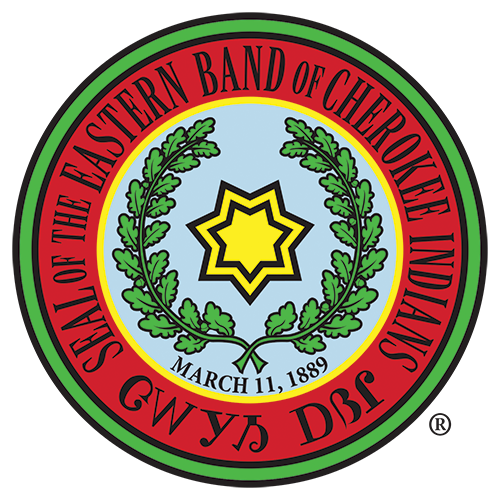
Office of the Attorney General
Providing legal resources for the EBCI
Office of the Attorney General
 The Office of the Attorney General lies within the Tribe’s Department of Justice, both of which are established in Cherokee Code (C.C.) Chapter 114. The Office of the Attorney General is the primary legal resource for the Tribe. The attorneys in the AG’s office provide legal analysis, advice and legal support to all Tribal programs and entities that request assistance. The attorneys work collaboratively with each other and other Tribal Government programs and entities to develop laws, policies and procedures, and to administer special projects. The Office of the Attorney General is the Tribe’s agent for legal service in litigation against the Tribe and its legal entities and defends the Tribe and its entities in lawsuits brought against them. The Office of the Attorney General provides the most cost-effective legal service for the Tribe as a whole.
The Office of the Attorney General lies within the Tribe’s Department of Justice, both of which are established in Cherokee Code (C.C.) Chapter 114. The Office of the Attorney General is the primary legal resource for the Tribe. The attorneys in the AG’s office provide legal analysis, advice and legal support to all Tribal programs and entities that request assistance. The attorneys work collaboratively with each other and other Tribal Government programs and entities to develop laws, policies and procedures, and to administer special projects. The Office of the Attorney General is the Tribe’s agent for legal service in litigation against the Tribe and its legal entities and defends the Tribe and its entities in lawsuits brought against them. The Office of the Attorney General provides the most cost-effective legal service for the Tribe as a whole.
By ordinance or by virtue of the Tribe’s organizational chart, the Office of the Attorney General has responsibility for the following offices:
- Civil Law Division (also known as the AG’s Office).
- Criminal Law Division (also known as the Prosecutor’s Office).
- Legal Assistance Office (LAO).
- Family Safety Program attorney.
- Tribal Realty Services Office.
- Survey Office.
- GIS Office.
- Enrollment Office.
All of these divisions and offices have their own directors or managers. As of September 30, 2018, the director of the Office of the Attorney General is Michael W. McConnell, Interim Attorney General.
Civil Law
The Legal Assistance Office is a Tribal program of the Eastern Band of Cherokee Indians, under the Office of the Attorney General.
Mission: Empower and strengthen Cherokee families and individuals by providing meaningful access to the civil justice system
Program description: The Legal Assistance Office (LAO) expands access to justice for the Cherokee community through direct legal representation, community outreach, and advocacy. LAO attorneys provide representation and/or advice in the areas of domestic violence, child custody, family safety program, end-of-life planning, EBCI employees, and adult guardianship.
History of the LAO:
The LAO was created by Ordinance No. 118 (2016), which was ratified by Tribal Council on June 2, 2016 and approved by the Principal Chief on June 21, 2016. The program was established to provide legal services to individual Tribal members who cannot otherwise afford those services.
What We Do
Types of Cases Handled by the EBCI Legal Assistance Office
- End-of-Life Planning Documents:We draft simple wills, powers of attorney, health care powers of attorney, and advance directives for enrolled members, spouses of enrolled members, first descendants, and tribal employees.
- Family Safety Parent Representation: We accept court-appointed cases to represent parents and caregivers whose children are involved with the EBCI Family Safety Program.
- Domestic Violence: We accept referrals from the EBCI’s Domestic Violence/Sexual Assault Program to represent their clients in domestic violence-related civil law cases (including obtaining domestic violence protective orders; child custody; and landlord/tenant matters).
- EBCI Employees: We provide limited advice and counsel to EBCI employees who have been subject to disciplinary action or termination.
- Child Custody: We represent qualified Tribal members in child custody actions in the Cherokee Court. A Tribal member qualifies for representation in child custody matters if he or she meets all of the following criteria:
- (1)The individual must be an enrolled member;
- (2)The Cherokee Court must have jurisdiction of the case;
- (3)The individual must be seeking an initial custody order;
- (4)The individual must be “indigent” as defined in our policies; and
- (5)The individual must be a parent or other caregiver with standing to sue for custody.
- Adult Guardianship: We accept referrals from the EBCI Family Safety Program to represent protected individuals in need of a guardian.
- Community Education, Self-Help Resources, and Brief Advice: In addition to direct representation, our staff can provide community education seminars, develop self-help resources, and give brief advice about a variety of other legal matters if time allows.
The authority of the EBCI Legal Assistance Office to represent Tribal members on these matters is expressed in, and limited by, Cherokee Code Sec. 114A-2.
Our Staff
Bonnie Claxton, Program Manager
Bonnie started with the EBCI in October 2016. Bonnie grew up in Sylva, NC and is an enrolled member of the Chickasaw Nation. She earned her Juris Doctor in 2013 from William Mitchell College of Law (now Mitchell Hamline) after graduating from the University of Georgia in 2007. In law school, Bonnie was President of the school’s Native American Law Students Association and Chair of the Minnesota Justice Foundation, the school’s public interest law group. After law school, Bonnie moved back home and worked in private practice at Coward, Hicks, & Siler in Sylva before becoming a staff attorney at Legal Aid of North Carolina. While at Legal Aid, Bonnie focused on representing members of the Eastern Band of Cherokee Indians and increasing access to the civil justice system for the Cherokee community.
Jamie Arnold, Legal Services Attorney
Jamie started with the EBCI in December of 2018. His focus is Domestic Violence and survivor advocacy, Divorce, Child Custody, and Family Safety. Jamie received a B.S. in Biology from the University of North Alabama, a Juris Doctorate in law from the Appalachian School of Law. He came to the Legal Assistance Office after a career in private practice, where he primarily practiced domestic and civil law. Jamie is a veteran of the U.S. Air Force and Army. He is an avid outdoorsman and spends most of his free time outside adventuring with his family and dogs.
Stephanie Lepre, Legal Services Attorney
Stephanie started with the EBCI in January 2019. Her focus in the Legal Assistance Office is parents’ representation in Family Safety Court, Custody, and Elder Abuse, Neglect, and Exploitation. Before coming to work for the Tribe, Stephanie spent nine years practicing law in Cherokee County, NC. She received her Juris Doctor and M.A. in Psychology in 2010 from Valparaiso University in Valparaiso, IN. Her undergraduate education was completed Sage College in Albany, NY. Stephanie’s private practice consisted primarily of parents’ representation in DSS Court, criminal defense, and custody.
Hali Jenkins, Legal Services Paralegal
Hali began work with the EBCI Legal Assistance Office in May 2017. She is an enrolled member of the EBCI and resides on the Qualla Boundary in the Birdtown Community. She received her A.A.S. in Paralegal Technology in 2015 from Southwestern Community College in Sylva, NC. In 2017, Hali became a North Carolina State Bar Certified Paralegal. Hali is expected to graduate from Western Carolina University in 2021 with a B.S. in Criminal Justice.
Heather Maney, Administrative Assistant
Heather began working for the Legal Assistance Office in October 2018. She resides in Sylva, NC. Heather attended Southwestern Community College where she received her A.A.S. in Human Services Technology-Substance Abuse in 2011 and a certificate in Paralegal Technology in 2020. Heather has many years of experience in the legal field. She has held positions at Swain County DSS, Tribal Child Support and the Cherokee Clerk’s Office.
Contact Us
828-359-7400
legalhelp@nc-cherokee.com
Mailing Address:
P.O. Box 2280
Cherokee, NC 28719
Physical Address:
Ginger Lynn Welch Complex
810 Acquoni Road
Cherokee, NC 28719
How to find us:
Coming in the front door of GLW, you will see the Qualla Library directly in front of you. Turn left and then right down the long hallway. Before the glass door at the end of the hallway, our window is on your right.
Additional Links:
Criminal Law – Office of the Tribal Prosecutor
Criminal law matters are handled by the Office of the Tribal Prosecutor, which is established in C.C. 114-3. The primary responsibilities of the office are to prosecute criminal, traffic, and juvenile cases in the Cherokee Court and to prosecute in Federal Court qualifying criminal cases occurring within the jurisdiction of the Tribe. Currently, the Prosecutor’s Office has three prosecutors and a victim witness coordinator/paralegal, whose job is to assist the prosecutors. The office of the Tribal Prosecutor:
- Provides direct representation of the Eastern Band of Cherokee Indians in the prosecution of crime occurring on Tribal lands.
- Works collaboratively with multiagency initiatives to increase capacity for monitoring how well the entire justice system is responding to crimes and advocating for improvements and strategies based on best practices and data-informed analysis, with the goal of reducing crime on Tribal lands.
- Regularly meets with and prepares victims for Court, including victims of domestic violence, child victims, and victims of property crimes.
- Assists the Cherokee Indian Police Department by providing guidance regarding criminal investigations, drafting of search warrants, charging decisions, jurisdictional issues, case law updates, and report writing.
- Serves as the primary liaison between the Eastern Band of Cherokee Indians and the United States Attorney’s Office for the Western District of North Carolina.
As of September 30, 2018, the manager of the Office of the Tribal Prosecutor is Justin Eason, Lead Prosecutor.
Enrollment
The Enrollment Office is established in C.C. Chapter 49. It administers Tribal law governing membership in the Eastern Band of Cherokee Indians. The Enrollment Office provides administrative and support services to the public applying for enrollment. It presents applications for enrollment to the Enrollment Committee for approval and maintains official enrollment records. The office collaborates with and supports Tribal finance, human services programs, and other Tribal departments and entities concerning transactions requiring enrollment status and enrollment information. The Enrollment Office has one director and five staff members.
As of September 30, 2018, the Tribe’s Enrollment Officer and manager of the Enrollment Office is Melanie Lambert.
